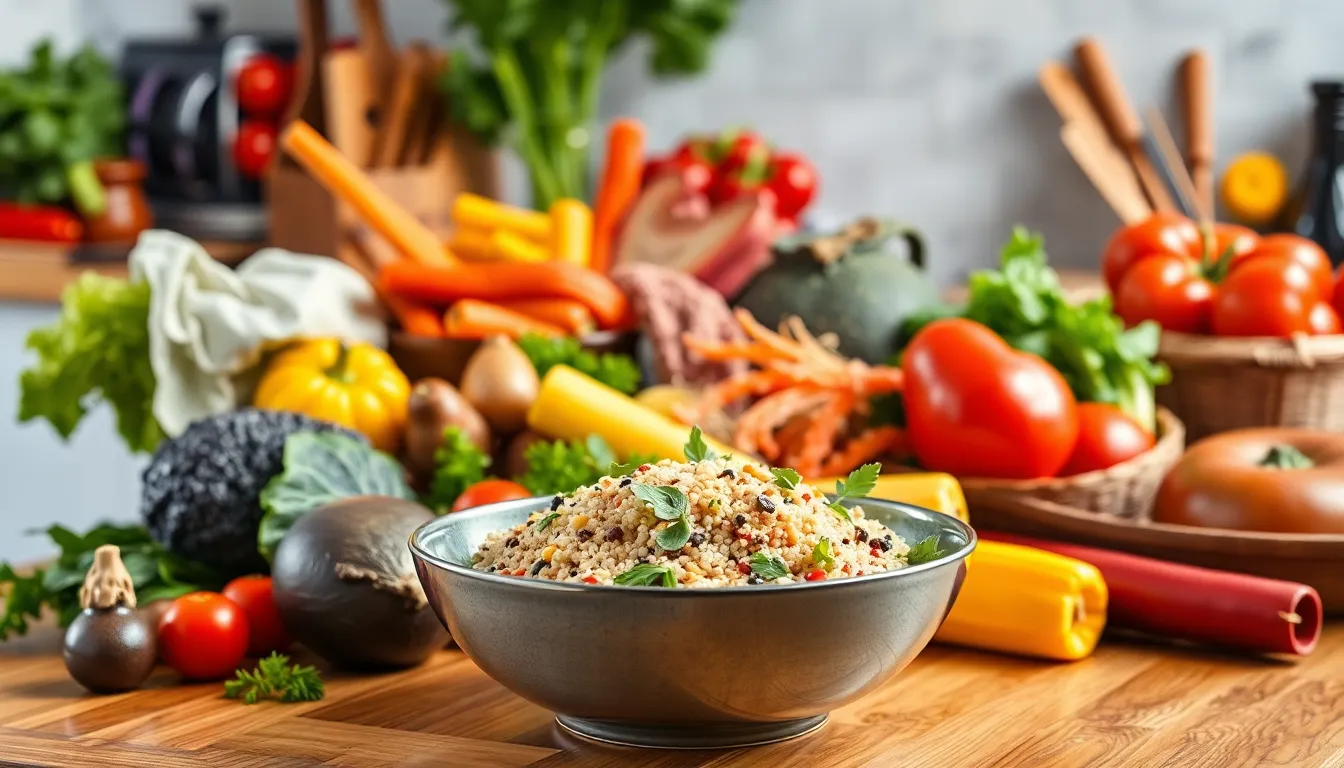In a world where kale reigns supreme and quinoa is the new black, healthy eating can sometimes feel like a chore. But what if he told you that healthy recipes could be both delicious and fun? Imagine whipping up meals that not only make your taste buds dance but also leave your body thanking you.
Table of Contents
ToggleOverview of Healthy Recipes
Healthy recipes encompass a variety of ingredients that promote well-being. Many meals feature fresh vegetables, lean proteins, and whole grains, providing essential nutrients. Popular options include salads, smoothies, and stir-fries, each packed with vitamins and minerals. Easy-to-follow instructions simplify the cooking process, making it accessible for all skill levels.
Focusing on flavors enhances the overall eating experience. Various herbs and spices add depth without introducing excess calories or sodium. For example, garlic, basil, and ginger elevate taste while offering additional health benefits. Seasonal produce ensures maximum freshness and taste, supporting local farmers and the environment.
Substitutions often make traditional recipes healthier. Choosing Greek yogurt instead of sour cream reduces fat content while maintaining creaminess. Using whole grain pasta instead of white pasta increases fiber and nutritional value. Exploring alternatives expands culinary options and satisfies different dietary preferences.
Meal prepping promotes consistent healthy eating habits. Preparing a week’s worth of balanced meals in advance saves time and encourages mindful eating. Containers make it easy to store and reheat meals, contributing to a more organized kitchen routine.
Incorporating healthy recipes into daily life encourages long-term wellness. Enjoying diverse dishes maintains interest and prevents monotony. Sharing meals with family or friends fosters connection while promoting nutritious choices. Prioritizing health through enjoyable cooking inspires individuals to make better dietary decisions.
Benefits of Healthy Recipes

Healthy recipes provide numerous advantages that promote overall well-being. These meals showcase ingredients that nourish the body while continuing to deliver great taste.
Nutritional Value
Nutritional benefits play a vital role in healthy recipes. Fresh vegetables, lean proteins, and whole grains contribute essential vitamins and minerals. Ingredients like spinach, salmon, and quinoa offer antioxidants and fiber, supporting various bodily functions. Meals prepared with seasonal produce maximize taste and nutrient density. Using herbs and spices instead of added sugars or unhealthy fats enhances flavor profile without compromising health. Nutrient-rich foods help maintain energy levels and support immune function, proving that eating well doesn’t mean sacrificing enjoyment.
Weight Management
Weight management achieves significant improvement with healthy recipes. Balanced meals offer controlled calorie intake while ensuring nutrient adequacy. Choosing whole foods instead of processed alternatives helps reduce empty calories. Fiber-rich ingredients promote satiety, making it easier to regulate portions. Incorporating lean proteins aids muscle retention, even during weight loss. Meal prepping supports consistency, allowing individuals to stick to healthy eating patterns. Together, these strategies create a sustainable approach to achieving and maintaining a healthy weight.
Types of Healthy Recipes
Healthy recipes encompass a range of meal types that promote well-being and flavor. Below are various categories that highlight the versatility of nutritious cooking.
Breakfast Ideas
Start the day right with nutritious breakfast options. Overnight oats combine rolled oats, Greek yogurt, and fruits for a filling morning meal. Smoothie bowls blend spinach, banana, and almond milk topped with nuts and seeds, providing vitamins and minerals. Whole grain toast with avocado and poached eggs offers healthy fats and protein to fuel energy levels.
Lunch Options
Elevate lunchtime with balanced and vibrant meals. Quinoa salad featuring cherry tomatoes, cucumbers, and feta cheese delivers protein and fiber in each bite. A wrap made with whole grain tortillas, lean turkey, and an assortment of veggies keeps lunches exciting and nutritious. Lentil soup packed with carrots and celery serves as a comforting option, rich in nutrients.
Dinner Suggestions
End the day with satisfying dinner recipes. Grilled salmon with roasted asparagus and brown rice ensures a hearty mix of omega-3 fatty acids and whole grains. Stir-fried chicken and vegetables in teriyaki sauce create a flavorful, protein-rich meal. A vegetable curry with chickpeas and cauliflower offers a plant-based alternative, full of taste and fiber.
Tips for Creating Healthy Recipes
Creating healthy recipes involves strategic choices that enhance nutrition without sacrificing flavor. Focusing on whole foods and embracing ingredient versatility fosters a satisfying culinary experience.
Ingredient Substitutions
One effective approach involves substituting high-calorie or processed ingredients with healthier alternatives. Greek yogurt serves as an excellent replacement for sour cream in dips and dressings. Ripe avocados can take the place of butter in baking recipes, improving texture without extra saturated fat. Whole grain pasta provides more fiber compared to traditional white pasta, enhancing the overall dish’s nutritional profile. For sweeteners, honey or maple syrup can replace refined sugar, adding a natural sweetness and unique flavor. Each substitution improves health benefits while retaining the overall taste of recipes.
Cooking Techniques
Using the right cooking techniques significantly impacts the healthiness of meals. Grilling or baking instead of frying reduces unnecessary fats. Steaming vegetables preserves vitamins and minerals better than boiling. Incorporating slow cooking allows flavors to meld without added oils or fats. Sautéing with broth or water instead of oil can minimize calorie intake. Roasting brings out natural sweetness in vegetables, making them palatable while requiring fewer added ingredients. Embracing these techniques enhances dish flavor and maximizes nutrient retention.
Embracing healthy recipes can transform mealtime into a delightful experience. By focusing on fresh ingredients and creative cooking methods, anyone can enjoy meals that are both nutritious and satisfying. The versatility of healthy dishes allows for endless experimentation with flavors and textures.
Incorporating seasonal produce and making simple ingredient swaps can elevate the health benefits of traditional meals. Meal prepping not only simplifies the cooking process but also ensures that balanced options are readily available.
Ultimately, the journey to healthier eating is about enjoying the process and sharing delicious meals with loved ones. With these healthy recipes, anyone can cultivate a lifestyle that prioritizes well-being without sacrificing taste.


